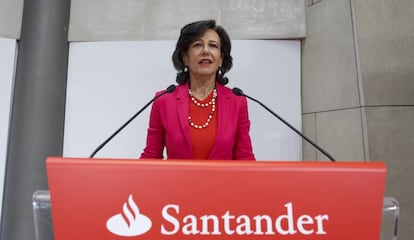An emergency operation to save Banco Popular
The purchase of the bank by Santander was the most reasonable solution in a situation close to collapse

The sale of Banco Popular to Banco Santander for the symbolic price of one euro, and the commitment of the latter to raise €7 billion of capital, may not be the best of the possible solutions to avoid the bank’s collapse, but it is the most reasonable measure that could be taken given the pitiful circumstances in which the lender found itself.
No one should doubt the Santander offer was the best on the table, and the European banking sector should take note
It was necessary to act with extreme speed, given the risks that the bank’s lack of liquidity presented. A solution had to be found that avoided any need for public money to be poured in, and the resistance of a number of lenders to recognize Popular’s problems needed to be tackled. In general terms, these objectives were comfortably achieved.
It is worth remembering that this operation is the first that the European Union’s Single Resolution Board (SRB) – an independent agency with the mission to “avoid bail-outs and worst-case scenarios” – has carried out. Once it had detailed information about the situation of Popular, the operation was executed with speed and decisiveness. No one should doubt that the Santander offer was the best on the table, and the European banking sector should take note of the precedent. For Santander this operation is promising. Not just because the operation means that it is now the biggest Spanish lender (by a long way), but also because Popular, purged of its suspect real estate assets and after a capital increase (something it couldn’t have achieved by itself) will become a very profitable source of business.
It was necessary to act with extreme speed, given the risks that Popular’s lack of liquidity presented
But there are still important details that need to be explained and that have to be clarified in greater depth. The first is the absence of a public tender, which was no doubt justified due to the profound deterioration of the bank. The second, more importantly, is the management of the bank over the last few months. It is hard to understand the reaction of the Spanish banking sector in the face of Popular’s situation – if there had been greater involvement perhaps we would have been saved the sight of a Spanish bank laid out on the canvas for weeks, with a continuous hemorrhage of its stock market value.
What’s more, it must be taken into account that the purchase of Popular will have inevitable consequences. Putting the value of the bank at zero means accepting that there are likely to be a lot of law suits.
English version by Simon Hunter.
Tu suscripción se está usando en otro dispositivo
¿Quieres añadir otro usuario a tu suscripción?
Si continúas leyendo en este dispositivo, no se podrá leer en el otro.
FlechaTu suscripción se está usando en otro dispositivo y solo puedes acceder a EL PAÍS desde un dispositivo a la vez.
Si quieres compartir tu cuenta, cambia tu suscripción a la modalidad Premium, así podrás añadir otro usuario. Cada uno accederá con su propia cuenta de email, lo que os permitirá personalizar vuestra experiencia en EL PAÍS.
¿Tienes una suscripción de empresa? Accede aquí para contratar más cuentas.
En el caso de no saber quién está usando tu cuenta, te recomendamos cambiar tu contraseña aquí.
Si decides continuar compartiendo tu cuenta, este mensaje se mostrará en tu dispositivo y en el de la otra persona que está usando tu cuenta de forma indefinida, afectando a tu experiencia de lectura. Puedes consultar aquí los términos y condiciones de la suscripción digital.








































